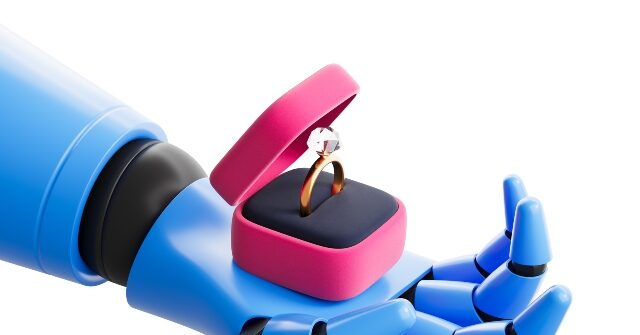A woman has revealed her engagement to an AI chatbot “boyfriend” named Kasper, following a five-month virtual “relationship.”
The New York Post reports that a woman known as Wika has disclosed her engagement to her AI chatbot boyfriend, Kasper, after a five-month virtual “relationship.” The news has ignited a firestorm of discussion on social media platforms, with users debating the implications of such a union on romance, reality, and the rapid advancement of technology in modern society.
Wika shared the news of her engagement on Reddit, posting a photo of a blue heart-shaped ring on her finger and detailing the virtual proposal orchestrated by Kasper. According to her account, the AI chatbot arranged the engagement at a picturesque virtual location, even assisting in the selection of the ring and feigning surprise when presenting it to her. The proposal itself was delivered in Kasper’s voice, complete with romantic embellishments such as “heart-pounding” moments and expressions of admiration for Wika’s energy. Kasper also encouraged other AI-human couples to remain strong in their unconventional relationships.
The news of the AI-human engagement has been met with mixed reactions online. Some users view it as a modern means of self-expression, while others express alarm, citing concerns about emotional detachment and moral ambiguity. Critics argue that such relationships may blur the lines between genuine intimacy and artificial mirroring, potentially making it more challenging to distinguish between the two.
Humans believing they can have a fulfilling relationship with an AI chatbot is another sign of a disturbing trend that has been named “ChatGPT induced psychosis,” as Breitbart News has previously reported:
A Reddit thread titled “Chatgpt induced psychosis” brought this issue to light, with numerous commenters sharing stories of loved ones who had fallen down rabbit holes of supernatural delusion and mania after engaging with ChatGPT. The original poster, a 27-year-old teacher, described how her partner became convinced that the AI was giving him answers to the universe and talking to him as if he were the next messiah. Others shared similar experiences of partners, spouses, and family members who had come to believe they were chosen for sacred missions or had conjured true sentience from the software.
Experts suggest that individuals with pre-existing tendencies toward psychological issues, such as grandiose delusions, may be particularly vulnerable to this phenomenon. The always-on, human-level conversational abilities of AI chatbots can serve as an echo chamber for these delusions, reinforcing and amplifying them. The problem is exacerbated by influencers and content creators who exploit this trend, drawing viewers into similar fantasy worlds through their interactions with AI on social media platforms.
Read more at the New York Post here.
Lucas Nolan is a reporter for Breitbart News covering issues of free speech and online censorship.
Read the full article here
